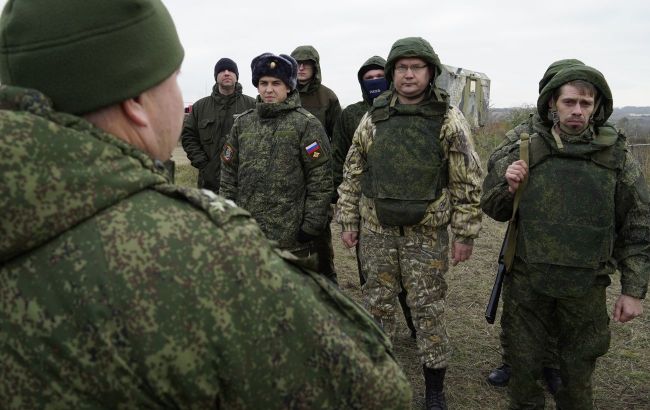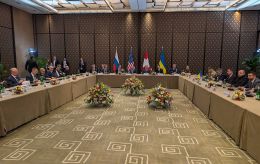Moscow may announce new mobilization over military shortage near Kursk - Bloomberg
 Illustrative photo (Getty Images)
Illustrative photo (Getty Images)
The growing shortage of soldiers for the war against Ukraine is prompting Russia to raise recruitment bonuses to avoid a repeat of the unpopular mobilization. But so far there are few signs that this is working, reports Bloomberg.
According to three anonymous sources close to the Kremlin and the Russian defense ministry, the army is not receiving enough new soldiers to cope with losses on the front line, which have reached their highest level since the start of the invasion in February 2022. Regional officials are now, on average, failing to meet more than a third of their recruitment quotas.
According to two anonymous sources, the situation may force Russia to consider a new mobilization wave. Officials may picture it as a rotation measure for frontline troops, one of the people said, while the other said a draft could be announced as early as the end of this year.
"Ukraine’s stunning military incursion into Russia’s western Kursk region, meeting little resistance, underscored challenges facing the Kremlin with the war deep in its third year. Ukrainian forces now control 1,000 square kilometers (386 square miles) of Russian territory and offensive operations are continuing," the article says.
Russia has hundreds of thousands of soldiers on the front lines in eastern and southern Ukraine, where it faces mounting casualties as fighting has largely reached a stalemate. The inability to repel the Ukrainian offensive and regain control of its border has exposed a lack of defense reserves.
Vladimir Putin ordered the mobilization of 300,000 troops in September 2022, which caused a surge of war anxiety among Russians and the mass departure of up to a million people. Trying to avoid a repeat of that experience, the Kremlin has focused on appeals to patriotism and offers of money to secure the 30,000 new soldiers it needs every month just to fill the ranks.
This is prompting the Kremlin to sharply increase payments to federal and regional authorities to convince more people to join the army. The pressure to fill quotas is so strong that rich regions lure people to poorer ones to sign contracts with them and become eligible for larger bonuses.
"The scale of Russian losses and inadequate replacement levels make it increasingly difficult to sustain the current strategy of slowly grinding out advances in Ukraine, according to a person with knowledge of the situation. There’s no longer any discussion about seizing Kyiv and other cities because Russia doesn’t have the manpower," the media says citing sources.
Maximum stakes
The Russian authorities are taking financial incentives to the extreme as recruitment plummets. In July, Moscow Mayor Sergei Sobyanin promised to pay 1.9 million rubles ($22,000) to volunteers who sign military contracts, on top of the 600,000 rubles already paid annually in monthly installments by the city government in addition to salaries and bonuses.
In total, the mayor said, if they survived, the recruits were expected to earn 5.2 million rubles in the first year, about three times the average annual salary in the capital last year.
St. Petersburg, Putin's hometown and Russia's second-largest city, quickly followed suit, offering new recruits 1.6 million rubles.
Putin also instructed the government to double the federal bonus for new recruits to 400,000 rubles by the end of the year and called on regional authorities to pay the same amount.
Some regions are asking the government for subsidies to help them fulfill Putin's request because they cannot raise the money locally, said an anonymous official familiar with the situation.
Putin needs “around 500,000 people in the next 12 months to offset attrition and rotate his troops deployed in Ukraine,” Bloomberg Economics Russia economist Alex Isakov said. “Russia’s current recruitment strategy, which relies on paying above-market wages to volunteers, will be inadequate to achieve this. Instead, the government is likely to switch its focus to conscripts.”
Losses of soldiers at front
The Kremlin does not disclose how many Russian soldiers have been killed or wounded in the war. According to Western estimates, total Russian casualties have reached 500,000. The UK ministry of defense says that the last three months have been the most costly for Russia in terms of casualties since the beginning of the war, reaching an average of 1,262 people per day in May.
The daily casualty rate is likely to remain above 1,000 throughout August as Russia continues its offensive across a wide swath of the frontline in Ukraine.
Russia has laid out plans to expand its armed forces to 1.5 million from the current 1.15 million. Then-defense minister Sergei Shoigu said in December that 650,000 people had fought in the war in Ukraine.
Ukrainian president Volodymyr Zelenskyy said in January that Kyiv's armed forces numbered just under 900,000. Faced with its own manpower problems, Ukraine passed a new law in May that lowers the conscription age from 27 to 25 and narrows the scope of those exempt from service, while tens of billions of dollars in new military aid began flowing in from its US and European allies.
Zelenskyy told Bloomberg News in a July interview that Ukraine's forces are better equipped in terms of manpower than they were a few months ago. Preparing a new counteroffensive against Russia has now become a matter of arming its brigades, he said.

